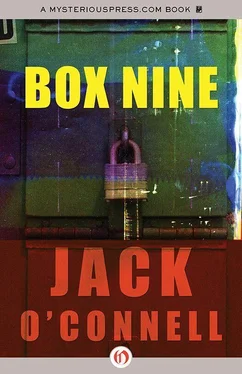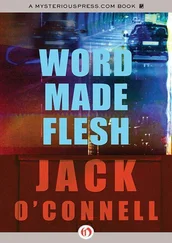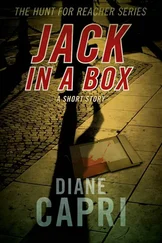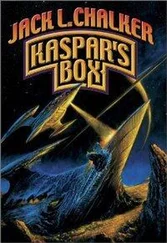As he walks, Ike keeps looking for signs of something out of the ordinary, abnormal, alarming. But everything on the street looks as it always looks, calm and boring. Uneventful. Status quo. He expects disaster, and the fact that there’s no sign of its approach is in some ways disturbing and frightening. He starts a mild jog down the last block to Sapir and starts to wonder what he’ll say to Eva. He’s decided that no matter what kind of decisions she’s reached about the events of the past week, he’s going to spell everything out for Lenore. He’s going to put it all in her lap and tell her to make the hard choices. He’s out. He will not participate for another day in this weirdness. He’s handing it to his sister whether Eva likes it or not.
He comes to the corner, turns onto Sapir, and heads for the station. The main streelight in front of the station entrance is burned out, but in the employee parking lot, he can see Eva’s Volkswagen. The interior lights are on, but the car is empty. Ike runs over to it and finds the driver’s door slightly ajar. He looks inside, checks out the front and back seats, sees nothing. He leans into the door with his hip, closing it and shutting out the lights.
He doesn’t want to get inside the car and wait, though he thinks it’s possible that this was Eva’s intention. He turns his back to the car and leans his behind against the side, folds his arms across his chest, and looks around the lot. Someone’s thrown a newspaper, it looks like The Spy , on the ground and pages have separated and are blowing across the lot, until they get stuck up against the station’s walls. Every time the wind blows, the newspaper pages make a riffling sound, louder than Ike would expect. He hates the noise, but not enough to go gather the papers together.
He checks his wrist and remembers he didn’t wear his watch. He brings his arms down from his chest and pushes his hands into his jacket pockets. Then he looks to the employee entrance next to the bay doors where the trucks load and unload. A light is on inside.
He walks over to the cement ledge where the mail trucks back up to the dock. He climbs up and looks in the small window covered with a wire grid. He pulls on the knob and the door comes open.
First, he sticks just his head into the corridor. He calls, “Eva,” softly. There’s no answer. He wants to let the door swing closed and run back home, worry about what Eva might have to say tomorrow. But he steps inside, closes the door behind him, and calls her name again. He starts to walk down the short corridor. It leads to a set of swinging, round-edged, double doors that always remind him of submarine doorways from the movies. The swinging doors lead into the main workroom, the sorting area, and the cages.
He pushes through and steps into the main body of the station. Patches of light from the moon make it through the front windows and cast shadows off the jutting arms of the cages. Ike stands still until he’s convinced that each shadow is just a trick of light blocked by unanimated metal. Then he moves toward the front of the building.
Eva’s office door is open. Ike steps inside and looks on her desk. There’s no note, no sign that she’s been there and left by foot, abandoned her stalled Volks, called away by an emergency or new information. He moves into the main foyer of the station and looks out the window. The streetlight flickers for a moment, but fails to ignite. He wishes it would either stay dead and dark or snap on for good. None of this in-between crap.
Someone left the back entrance open, he tells himself, and Eva’s the only one with the keys. He steps back from the window, starts to head for the main doors to take another look at the car. Then he notices something on the floor. Something spilled. A line of liquid. A trail of something dripped, leading to the front entrance.
He keeps himself from bending and touching it, from bringing a sample dab up near his nose for a smell. Instead, he follows the runny line. It breaks here and there, leaves small gaps, then disappears completely in the small vestibule to the right of the entranceway, the small antechamber of post office boxes. Three walls lined with rented cubbyholes with brass faces and individual combination locks.
There are two hundred rental boxes. They come in three sizes — the small letter drawers, the slightly larger “flats” drawers, and the big, deep boxes, usually used by businesses. Only one of the two hundred is ajar. It’s a deep box, positioned at floor level. Ike starts to shake his head as soon as he sees it is open just a half an inch.
And then the smell hits him. Like biology lab in high school. Like a dentist’s office. That chemical smell, formaldehyde-like, something like a mask for the odor of decay. Only it doesn’t mask, it blends, so that a new smell is formed.
His feet pull him to the wall of boxes and his stomach starts to tighten. He squats down, takes the weight of his body in his knees and thighs. He’s sweating everywhere. The back of his throat has taken on a deep burn, an ache. His eyes squint and there’s a pain in both his lungs and his temples that seems to alternate perfectly, one asserting as the other recedes.
His hand extends, fingers come up into the underside groove of the box handle. He draws it out, pulls it to him, and at the same time looks at the label on the face. Of course. It’s box nine.
The smell hits him full now and he gags. He brings his head forward, makes himself look.
It’s Eva’s head, independent of the neck, shoulders, the rest of the body. It’s severed clean. The eyes slightly open. The eyes are almost squinting at him and he has a slightly subconscious, instantaneous idea that, like some novelty pictures of dogs and clowns that he’s seen for sale on roadsides, the eyes might follow him if he moved, changed position. But they’re still Eva’s eyes, the taut lids he brought his tongue to just hours ago.
It is Eva’s head. He’s looking down at Eva’s head. The hair is matted down to the skull with blood. It’s sitting in a round pan, a cooking pan, lined with aluminum foil. The pan is filled, filling, with a mixture of blood and a syrupy green liquid, like a heavy shampoo. Some of the green syrup has splashed onto the inside walls of the box.
It’s Eva’s head.
And then there’s the sound of the double doors swinging open and closed.
St. James Cemetery is on the south side of the city. It lies in a shallow valley off Richer Avenue. It’s a large cemetery, stretches out almost to the city line. It’s bisected, almost perfectly, into two separate areas by the last skinny traces of the Benchley River as it begins to peter out.
The bisection by the river creates a division that seems too beautifully instructional to be coincidental. The section closest to Richer Ave, called the old section, was the whole of the original cemetery. It’s been filled to capacity for decades and holds the remains of the oldest of the Catholic families in Quinsigamond who butt heads with the Yankee founders of the city. When the last available grave in the old section was filled, new ground was broken on the opposite shore of the ten-foot riverbed. The new section was an immigrant neighborhood for the dead. The gravestones became ornate, bordered on the superstitious and maudlin, and the names on the stones were often long and blatantly non-Anglo-European.
At the western edge of both sections lies a stretch of tracks owned by the Providence-Quinsigamond Railroad Company. The tracks are part of a route that, like many in the P&Q system, are no longer operational. Rather than expend the cash to rip up the tracks, the railroad has simply ignored them, let them rust and fall under the cover of ten years’ worth of debris, fallen and dead trees and branches, supermarket carts and old tires. Along with the track, they left several antiquated freight cars, common, cheap rigs for industrial scrap and odds and ends. The cars have been home to squads of derelicts and drifters over the past ten years. About five years back, some old nomad’s body was found in February, dead of exposure, and there was some mayoral talk about petitioning the railroad to remove the public nuisance. But the talk faded and the cars still sit in a mini-forest of scrappy trees and beggar trash.
Читать дальше












